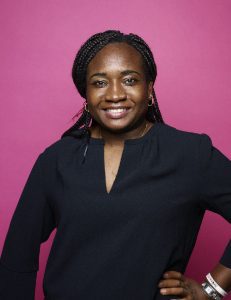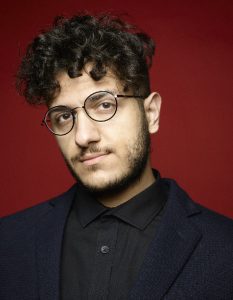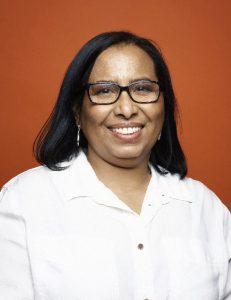During Covid-19 there have been a lot of personal issues such as relationship issues and domestic violence. It has escalated. These are vital factors to how children grow in their environment.
Covid-19 has made it even more difficult for people to cope and manage, and our workload has increased. For example, the clients that we previously contacted once in two months or once a month, we now contact every two weeks to make sure they’re okay.
I think nursing is a very respectable job. The public appreciates what nurses and healthcare professionals do generally, but maybe it is more highlighted now and more appreciated due to the current circumstances.
It’s great to care for people and make a difference to their lives. People who work in essential roles love their jobs. We are like sponges. We absorb anything our clients experience to support them. It’s difficult, but when you love your job it doesn’t feel that way.
What refugees face, especially as women, is very difficult, since they’re disadvantaged already in addition to other barriers such as language. Refugees bring lots of skills and experiences, and if they are given the opportunity, they can contribute.
People leave home for many reasons. Usually refugees leave home because of a political situation. It’s like the Somali poet Warsan Shire says: “no one leaves home, unless home is the mouth of a shark.”
It wasn’t my choice to come here and live here and die here, which is sad. I can’t go home, even in my dreams. This is the extent of the dire situation back home. When I go home in my dreams the soldiers run after me. It’s sad when your dreams are shattered because of the political situation.
Saleh

It was the beginning of March when I first heard about Covid-19. I was already working as an administrator in a GP surgery and we were receiving instructions from NHS England about what we would have to do with patients during the pandemic.
Normally I work in the reception area dealing with patients’ requirements over the phone and face-to-face, undertaking tasks like patient registration, scanning documents, requesting patient medication, and dealing with the chemist and clinicians.
In the beginning the pandemic situation wasn’t clear at all and I didn’t think it would affect my job very much in the sense that I work in the healthcare sector – in the NHS – and they need people, so I didn’t think I would lose my job.
But we worked harder and harder during the pandemic. We were under huge pressure – we just got busier and busier with patients during the lockdown. All the appointments were face-to-face before, but suddenly we closed all the doors, and we just triaged appointments on the telephone.
People were shocked. They’d been used to seeing the doctors in person and now were unable to see their GP. If we put ourselves in their shoes, we would have felt the same. We did our best to help them. The phones didn’t stop at all— sometimes we received 500-600 calls in a day!
Despite the challenges, I love working in the health sector. I like to help people find an appointment with other practices when we don’t have space. We try to do our best to help them, especially when they are older and worried about their health. I like to help people.
Working in the UK is different than back in my home country. I worked in Syria for a short period with my father and brothers as an electrician. Six months after I got an English Literature degree from the University of Aleppo I came to the UK, where I worked in an office. So already, my work experience in the UK was very different from that in Syria.
There are two challenges and barriers for refugees working in the UK. First, the English language. When I came to the UK, I found it really difficult to communicate with people. At first, I was in the north of England – in Yorkshire – and they have a very strong accent! It was very difficult to understand, but I got used to it and I liked it in the end.
The second obstacle is references. The majority of employers ask for professional references from former employers, as well as references from people you have known for two or three years. It is very difficult at the beginning to provide this, especially if you have not been in the country for very long.
I have been fortunate at work – my colleagues are excited to know my story. They just know Syria from the news but they do not know what’s really happening there. So, when they meet a person from Syria, they want to know what life is like there and how people stay safe. It’s very hard to be a refugee. You have to start from scratch, even though you sometimes have a degree.
Sometimes refugees work more than people who are born here because they come from war-torn countries. They miss their families — just like I still miss my mother who I wasn’t able to see before she died two and a half years ago. We think about our families every day, and because we know that we can’t go back home, there is a lot of responsibility on our shoulders to look after them from the UK, which is sometimes very hard.
Through the pandemic I’ve learned that I have to — and we all have to — be patient with patients. People working in the NHS are working hard to make people’s lives safe and we are all just doing our best.
Pinar

I remember people talked about coronavirus since the beginning of January, but it came to the UK around March. At first, I thought that I was going to lose my job. I thought that if there’s a lockdown, I can’t go out — and if I can’t go to work, then that means I will be unemployed. And so I thought that I could be made redundant. But I just kept working.
My manager took the decision that we could work from home for a short time. We started doing everything virtually. I work in recruitment HR for a care company. I contact our candidates to see if they need to complete online training and practical skills training and I respond to their emails if they have any queries.
During the first lockdown, we had lots of applicants, especially chefs who were applying for work because the restaurants had closed. It is challenging because we recruit carers, so I need to make sure that we are recruiting really good people. Carers deal with very vulnerable people in their own home, so, it would be very difficult if we recruited someone who is not reliable or has a history of abusive behaviour.
The best part of my work is when I see candidates start work. It makes me really happy.
After a while we had to return to the office to give PPE to our carers. Travelling to work, most of the time I was alone on the bus during the lockdown. There was no one around me. It would be nice if people noticed that what we are doing is not an easy thing.
I have learned how to deal with problems during these times. We are living in such a difficult world; anything can happen, and no one could have imagined this current situation would happen two years ago.
I never had a chance to work in Turkey. I graduated in 2019 and straightaway came to the UK. I did my internship in Human Resources for a non-profit organisation that helps children. Starting my working life in a different country with a totally different environment and new language has been a challenge.
I normally don’t tell people that I am a refugee and prefer if my colleagues don’t know. I think some people have quite a bad impression of refugees and asylum seekers in their minds, and that automatically they will have a negative image towards me. That’s why I keep it a secret as much as I can.
When you work as a refugee, many people don’t even know that you have the right to work in the UK. It would be nice if people understood our rights more.
Emad

When Covid-19 started I was working as a pharmacy assistant. I left that job and began to work as a swab-tester, going house to house driving my own car and testing people for coronavirus on behalf of the Office for National Statistics.
It was my dream to be a Doctor. I first studied Biomedical Science at Kingston University which was a three-year degree. I finished that degree, and then decided to transfer to Medicine. I got an offer from King’s College London — now I’m in my first year as a medical student.
Since the lectures are online, I thought: why not also work to help people? Hence this job. It is interesting — I never get bored and I don’t have my boss at work, nagging me all the time.
People provide their address, names, and contact numbers. Then I call them the night before, to arrange a time that suits both of us. I drive to their home, and they then do the swab test. Then I go through a questionnaire. Once everything is done, I collect the kits and drop them at the main collection point. The best part of the work is when I go up to people and they welcome you. They’re extra helpful, always smiling.
I learned that your personality contributes a lot to your wellbeing. So, it’s not just about the drugs and medications that you take, but also your psychology. Another thing I learned is that we humans are very dependent on each other and we can’t just overcome problems by ourselves.
Being a Covid-19 key worker has definitely helped me in my future career as a Doctor. As a Doctor, I will be dealing with people. So, this job has really helped me to be empathetic and, a good listener. Now I can put myself in their shoes and see problems from their perspective and get to know people from different ethnic backgrounds.
I want people to know that it’s really difficult to get a job as a refugee. I came here more than 10 years ago from Iran and I have faced many challenges as a refugee finding work. At first, I was an asylum seeker and legally, you’re not allowed to work in this country. But I survived through charitable contributions and friends’ help and support. You have to look for advice and connections. Breaking Barriers played a big role in helping me. They supported me with hardship funds and finding solicitors’ advice, which was really helpful.
My advice would be to have proper connections, always try to find friends because you can’t really survive on your own, you’re always dependent on others. There isn’t any button you can go out and press to become a billionaire. No, you have to just go out and seek opportunities and hope for the best. And don’t give up. You’ve come all the way here and you’ve already made it so you might as well just keep on going.
Tua

We would always gather every Monday with the ‘Women for Refugee Women’ charity. In March, the manager said that ‘we need to have a meeting’. We went and were told that they needed to close the drop-in. We were shocked; we took off and stayed at home.
I was so scared. It was like, if I go out, or touch a chair that somebody sat on, I will be infected. The Council had given me a place in a hostel and you can imagine, there were so many people there, so I was in my room all the time. When I went to get food everyone was rushing. One day I went to the shops. I was looking for tomatoes. I couldn’t even find one tomato. I stood and questioned if this was real.
I refused to even watch TV because I was crying every day. I was thinking it can happen to me, it can happen to everybody. My life really changed because of the lockdown. I didn’t see my friends anymore. This job was my first outing since the lockdown began, apart from going to the shops or to do my hair.
Before the lockdown I was volunteering as a domiciliary carer, going from house-to-house. I love cooking and I cook well for my clients. Now I work as a live-in carer in Milton Keynes with a client who has a spinal cord injury and mental health problems. I try to make English food for her – she likes roast chicken, mashed potatoes, and I’m an expert in making scrambled eggs the way she likes them. I stay there for two weeks at a time. There are some days that are really stressful, some days are really busy. If my client becomes a bit stressed, it’s difficult for me as well as for her.
I’ve had a lot of challenges for many years. I waited for 15 years for my refugee status, eventually getting my documents in 2019. I started looking for jobs, but it was a bit difficult because of the pandemic and because I had been unemployed for so many years. I was so stressed and knew that so many people were now also applying for jobs because of the pandemic.
Next year I want to go to University to study Mental Health Nursing. I took this job as a placement, to learn. When the nurses come to visit my client I ask a lot of questions. Little by little they always respond. Mental Health is not an easy course at University. But I will get there, by the grace of God.
Essential workers are unique. We are saving clients’ lives. Without us, they would not be here. I’m doing it from the bottom of my heart. It’s not about money — it’s about your care, your love.
I’m really grateful, and I really appreciate meeting Breaking Barriers. My caseworker has been like a sister to me, and has helped me so much with my University application.
Working as a refugee in the UK, some people think that maybe we don’t have rights. I’m very proud to be a refugee in this country though, and to go to school in this country, and to study at University to get my job. Of course you have to be proud of who you are. That’s me.
Kemi

I volunteer mainly with asylum seekers and women from migrant backgrounds, especially single mums during the lockdown. Many of us were isolated and getting depressed; with nobody to talk to, nowhere to go. That was killing a lot of people in silence.
So what I did was to create a group of about 30 mothers on Zoom. I teach them how to take care of their hair, how to sew clothes for themselves to keep them busy, and sometimes I bring in people to teach them how to do their facials. The following week they show me what they’ve done — just to keep them busy during the lockdown.
The best part of my voluntary work is seeing mums happy and seeing the expression on their faces. When I see them happy it makes me happy too. I’ve been in their shoes. I know how they feel. I want to help them get out of their shell sometimes — because I wasn’t lucky enough to have somebody help me get out of my shell.
I think it was on the news when first I heard about Covid-19. After January we saw that a lot of people were dying and becoming scared. It affected me a lot. I felt so depressed, there was nobody to talk to. Being in asylum accommodation, I didn’t know anybody — it was really stressful.
Going out to volunteer takes all those evil thoughts out of my mind. For me, seeing myself, dropping my daughter in nursery, going out to help people, seeing people laugh. The way we think, the way we see people, the way we talk to people — it all changed.
We came to the UK to make a living. We didn’t come to the UK to cause trouble or to take benefits or other things. We leave our country because of violence or for so many other reasons. I got my refugee status during the lockdown and my life started to change.
Working in the UK as a refugee is, to me, a privilege. It gives us room to be able to develop, to be part of the community, to integrate ourselves with the community, and also share our own knowledge with the community.
What I learned from the experience of lockdown is to keep people close to you. The positive effect of Covid-19 has been that my neighbours started to realise I was there. Before they did not even know that I existed, but during the lockdown, neighbours came to knock on my door — to ask if I was okay. These kinds of things brought solidarity and love among people. I hope we can keep it.








